|
Audio of Islanders interviewed by Advertiser Staff Writer Yasmin Anwar
RealPlayer plug-in required
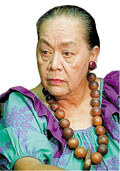 |
"I think OHA is on the road to becoming another state government entity (rather) than an advocate for Hawaiians, which is why it was created."
FRENCHY DeSOTO
OHA co-founder and former trustee |
• • •
| "The future will have its roots in what happened last year.
"I think it’s a watershed year - it’s been extremely exciting. It started off on a bad foot and did not turn a corner. The Barrett case is the next evolution of Rice. It’s a direct broadside hit on OHA and Hawaiian homes, and it’s going to be litigated in the next year and we’re all preparing for it. But what excites me is that a lot of Hawaiian groups coalesced. We’re talking positively about programs. The story has been OHA, but a lot of the rest of us have had our noses to the grindstone; we’re working our butts off and we’re producing.
"If you look beyond the hue and cry, there’s a lot of good things happening.
"Nothing has changed on the legislative political scene that would make the Supreme Court justices rule any differently on Rice, so I think we’re staying behind the eight ball on Barrett (the lawsuit challenging Article 12 of the state Constitution). Hopefully the Akaka bill gets passed, and hopefully we come up with creative approaches to defending the state constitution."
RAYNARD SOON
Chairman of the state Department of Hawaiian Home Lands |
• • •
 |
"With the exception of Rice vs. Cayetano, this is a very exciting time for Hawaiians. I’m cautiously optimistic we’ll see some real good partnerships evolve in coming years.
"The Hawaiian community as well as our supporters need to be forever vigilant, fighting off these challenges, staying focused on immediate needs out there, such as servicing the elderly. There are a lot more changes in store. Already there have been major changes at OHA and the Bishop Estate.
"The Akaka bill is a really critical piece of legislation, in that it protects our programs without a doubt and could elevate Hawaiians to a less vulnerable status.
"As for the ceded land dispute, I am hopeful that it can be resolved with serious and good-faith negotiations. Too many resources and energy have been lost in defending from challenges, but what has also grown out of this is a united effort in the Hawaiian community to pursue and engage in efforts to set up a viable sovereign entity. I’m hopeful that the Akaka bill will pass."
KALI WATSON
President of the Hawaiian Community Development Board and former chairman of the state Department of Hawaiian Home Lands |
• • •
| "There’s not just Hawaiians in the Island, so (OHA trustees) need input from different nationalities, so I think it’s good that non-Hawaiians are getting on the board...
"In Maile I can see those signs up there with the (sovereignty) flag flying. I think they’re getting more and more mad each year.... They were here first, so they should be taken care of."
BEN IBANEZ
Aircraft mechanic of Filipino ancestry, 33. |
• • •
| "Besides giving Freddy Rice the right to vote, (the U.S. Supreme Court ruling) forced Native Hawaiians to have to think about putting themselves in legal categories they didn’t find comfortable. It changed the rules and forced them to establish priorities. One way or another they had to face this federal recognition issue. Rice and the Akaka bill raised this whole notion of ‘Does this keep us from thinking more broadly about sovereignty?’ - the idea of who is Hawaiian and what it means to be Hawaiian.
"It has made people who have abstract academic arguments about sovereignty have to anchor them in real life. You have to exercise personal sovereignty. There were some people saying, ‘You’re telling us what we are, but what are we going to do?’ "
NEAL MILNER
Political scientist who discussed Rice vs. Cayetano case in his spring semester law and politics class at the University of Hawai‘i-Manoa. |
• • •
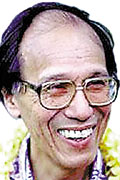 |
"It’s been a year of contradictions and ironies. For example, we kanaka maoli are being accused of being racist in our own homeland because we’re just trying to assert our own inherent sovereignty. We have a non-kanaka maoli Aloha for All group saying we kanaka maoli are racist because we are violating the 15th amendment to the U.S. Constitution. But they’re applying what we consider to be a foreign colonial law. Meanwhile, we find ourselves at odds with our fellow kanaka maoli who are willing to settle for nation-within-a-nation status, like American Indians and Alaska Natives, which is regrettable because it divides our people. Since we oppose the Akaka bill, and the Aloha for All people oppose the Akaka bill, we are aligned with Aloha for All, and so we need a sense of humor to deal with it because it’s all so painful.
"We feel it’s essential that we continue to persist in our stand for complete independence and never submit to anything less. We have to do it. There are others who are unwilling to do it and willing to accept less. We have no right to accept less than what is our full inheritance from our ancestors. We have no right to compromise."
KEKUNI BLAISDELL
Independence activist and physician at Queen’s Medical Center. |
• • •
 |
"They already took a lot from Hawaiian people. We’re just pissed off because they like take more....
"I think they should just let OHA be OHA, you know, how it was. But then I don’t know what Cayetano get planned.
No can do nothing but just fight ’em....
"If they take my property away from me, that’s when I’m going to fight. Other than that, I would want to be American....
(In the new year) "I want to see happy, or at least level. Hopefully this thing will be over next year, because it’s just a lot of damage to some people. Some people feel like a lot has been taken away from them."
KAHEALANI MERRITT
Nanakuli homesteader, McDonald’s employee, 20, mother of sons, 1 and 2 years old. |
• • •
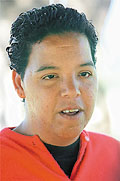 |
"There are a lot of people who are living on the beaches, and they’re not doing anything about them.... I think the government should try to supply homes for homeless people, people who are struggling out there....
"I’m on welfare and I’m struggling, and there are not jobs out there, and I’m having a hard time supplying for my kids....
"I’m ashamed to ask for anything. I’d rather not go to (OHA) because I know they’re not going to help us."
• Audio interview
EVELYN WILLACKER
Part-Hawaiian, 34, struggling on welfare in Wai‘anae. |
• • •
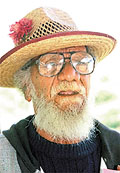 |
"He (Cayetano) jump inside OHA. Why don’t he do his job? No stick his nose in something he don’t know.... If he’s Hawaiian, I must be African....
"Going to be one big protest, because I think the Hawaiians, all the homesteaders, I think they’re planning ... guys are coming from the different islands. There will be war....
"What they’re trying to do - take away the rights of Hawaiians, poking their nose in Hawaiian homesteads - and Hawaiians got no say?
"You look at Makua, the Second World War... they came over here and made martial law, eh? It all wrong already, and they took over Makua, which is an ancient burial place, and they’re still bombing."
GANGA SOARES
A Wai‘anae resident and retiree of Hawaiian ancestry, 71. |
• • •
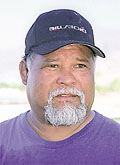 |
"OHA and Alu Like really helped my children. My two boys in the summertime, instead of staying on the streets and hanging with the guys, we put them in a program, and that would keep the kids busy. I didn’t have to go all over the place and look for the kids, ‘specially down this side. This side is a rough side, but Alu Like and OHA really helped. My other two girls, I sent them to college and I really appreciate that....
"If it weren’t for OHA and Hawaiian organizations, you’d be getting more kids on streets, more robberies, more people visiting the Islands and their cars would be robbed because the kids don’t have no programs. You hate to see that."
• Audio interview
GODFREY YOUNG
Wai‘anae Valley homesteader, city refuse collector, 55. |
• • •
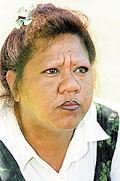 |
"The Hawaiian people, they don’t speak up for their rights. And when they do, they get into more trouble."
ELIZABETH CULLEN
Part-Hawaiian volunteer for mandated services at HCAP, 43. |
• • •
 |
"In Alaska we have a lot more Polynesians up there, because you can actually own a lot more there than you can in your homeland.... For $150,000 I can get four acres of land, a four-bedroom house, two car-garage and still have money to spare....
"They (Alaskans) have a lot more rights than we do. They get a check every month because they’re native.... The state did something for them, versus here, where you don’t get nothing."
• Audio interview
KAUPENA VILLANUEVA
Cellular phone technician, 23, who grew up in Maile and now lives in Alaska. |
• • •
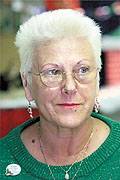 |
"If Hawaiians really want to be on their own, they’re going to have to go back to the old way of Hawai‘i, and
I don’t think most of them are prepared for that. If you really want independence - that means no federal, no state, no assistance - you stand on your own, and I don’t think in this day and age that’s feasible.
I think we all need help from somebody."
• Audio interview
YVONNE PEREZ
Income maintenance worker with Health and Human Services of Portuguese ancestry. |
• • •
 |
"Us Hawaiians all have to work together.... I see a lot of different activist groups that are not working together, and that is really sad. What are they doing? Why are they fighting? Why are they arguing? Just get the right issues together and work for the people....
"We need the United States.... If the United States moved out of Hawai‘i, what happens to the military? What happens if we get attacked?"
MAXINE KELI'I HOLOKAI
Wai‘anae resident of pure Hawaiian father and Hawaiian-Korean mother. |
• • •
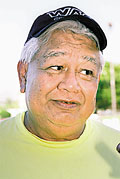 |
"I feel as long as you’ve got the paperwork and you can prove it, sovereignty is going to move in. Sooner or later it’s going to move in. It’s just that my people have to be a little bit patient. If they’re not patient enough, they’re going to miss the good deal....
"I want to see my grandchildren get the best education that the United States can give them. Education right now is kind of set back, because everyone is focusing on the sovereignty movement. We have some Hawaiian families who are really, really looking toward their children and grandchildren to get that education. If you don’t have that document that shows that you graduated and you have a degree, you’ll be just like the rest of us poor people."
BUDDY ALOHIKEA KELI'I HOLOKAI
Full-blooded Hawaiian, retired tour driver and guide born in New York, N.Y. |
|

